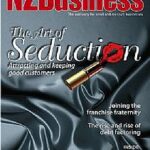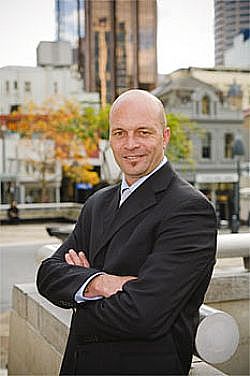Joining the franchise fraternity
Franchising continues to be one of the most successful business models to establish and to buy into. Patricia Moore has this update.
Franchises; if fast food and lawn mowing spring to mind, you’re in the right zone. But franchises are not limited to golden arches and Green Acres. Franchising works successfully across a huge range of industries, offering business opportunities to those who want to be their own boss while enjoying the benefits of a tried and true business model. And, while the US may be the home of franchising as we know it, Kiwis have taken to the system like no others.
“Franchising in New Zealand is very healthy,” says Simon Lord, editor, Franchise New Zealand magazine and website. “We have more franchise systems per capita than any other country in the world. About 350 franchise systems and probably 15,000 to 20,000 franchisees.”
More than 70 percent of franchises operating here are ‘home grown’, but there is also a wide range of imports from Australia, the US and Europe. Muffin Break, Brumby’s and Baker’s Delight are all well known on both sides of the Tasman, and the recent arrival of brands such as Howard’s Storage World, holySheet! (the brainchild of Kiwi Edmund George) and Vast Interior is making an impact on the retail sector – a franchise area Lord says has been relatively under-developed until now.
But it’s not all one-way traffic. Franchising also offers export potential for New Zealand brands. Fastway Couriers is now the world’s biggest franchised courier company. Dunedin-based Reload Juice and Salad Bars were granted franchise status in China and Singapore in 2006 and opened in Scotland earlier this year. And Simon Lord reports Esquires Coffee Houses, a Canadian brand launched here in 2004, has done so well for the New Zealand master franchisees, they have been awarded master franchise rights for the rest of the world (excluding the US and Europe).
Developing a franchise
So how easy is it to transform a successful little business into an even more successful national, or international, franchise? Win Robinson, managing director at Franchize Consultants NZ, specialists in the development of franchise programmes, says there are three ways a franchise can be started:
• where there is a prototype business operating;
• by converting competing businesses to a single franchise system and brand, or
• from an idea.
Robinson says the latter, based simply on theory, is the hardest and most problematical. “In this case it is imperative that very experienced franchise advisors become involved in designing and building the franchise structure.”
There are five key steps to developing a franchise programme, says Robinson.
1. Stragetic Planning – including a situation analysis, a feasibility study and implementation plan.
2. System Documentation – detailing how the franchisor requires the franchisee to operate the franchise.
3. Legal brief and Franchise Agreement – to be drawn up by a specialist franchise lawyer.
4. Recruitment Documentation
5. Franchisor Training – to ensure the franchisor understands the difference between running a franchise and a conventional business.
Get these five steps in place and your brand could well be recognised from North Cape to the Bluff.
Buying a franchise
But is becoming a franchisee – buying a brand – necessarily the solution for people wanting to be their own boss?
“It’s an easier track to tread,” says Franchize Consultants’ Robinson. “Not only has the business a proven track record, but the franchisor will be giving on-going support and assistance in operating and improving the business, all the way through the term of the franchise.”
It’s also worth noting surveys show less than one percent of franchisees are ever involved in significant disputes.
“Makes them a lot safer than marriage,” says Simon Lord.
Claire Byrne, partner, commercial, at Wellington law firm Gibson Sheat, and a specialist in the franchise sector, says the excitement of prospective business owners eager to embark on a new business venture is a real positive.
“But sometimes, as lawyers, we need to temper the enthusiasm by asking the hard questions.”
Byrne says for any prospective franchisee, due diligence is critical.
“This involves not only a review of the financial information provided by the franchisor, but also investigation of other franchisees within the franchise to determine what their experience is.”
While such investigations take time, says Byrne, it’s preferable to identify potential fish-hooks in the purchase before there is a binding contract. The object of the process, says Byrne, is to:
• Confirm the franchise opportunity will be financially successful,
• Be satisfied that the franchise is well supported by the franchisor with systems, marketing strategies, training and other assistance,
• Ensure the franchisee has what is required to successfully operate the franchise as a profitable business and obtain the necessary level of personal satisfaction.
A robust due diligence process will involve an accountant to review the financial information and assist with budgeting and other financial planning, a lawyer to review the legal documentation and negotiate any amendment to the terms, and the prospective franchisee.
“Working as a team the parties will achieve a greater result than by working in isolation,” says Byrne. “We recommend the financial review is commenced before the legal review. If the business doesn’t stack up financially there is no merit in proceeding.”
Franchising, says Byrne, is alive and well in New Zealand. “It is a proven, successful method of operating a business. However, success does not happen without a great degree of investigation and analysis.”
Financing your franchise business
All the major trading banks are heavily involved in financing the franchise sector. Franchised businesses is a key focus for The National Bank with many customers entering business for the first time through a franchise, says Viv Vesty, senior manager, Franchise and Professional Business.
“The proven business model and systems that a franchise can provide often is a significant ‘leg-up’ for a new business owner coping with the initial start-up phase.” Vesty says they strongly recommend clients investigate a franchise opportunity thoroughly, and get independent, franchise-specific, legal advice and good accounting support.
“Often this is an area where business owners are tempted to economise, but a few thousand dollars spent early on can save many more thousands, and months of heartache, down the track if the franchise turns out to be not the right one for them.”
While small business is usually seen as a risky investment, there has been a revolution in franchise financing, says Daniel Cloete, national franchising manager for Westpac. The bank, a strong supporter of the franchise industry in New Zealand through a number of initiatives, was the first to set up a specialist franchise unit here. Westpac lends against new businesses based on the success of the franchise system and all other franchisees, he says.
“In practice this means potential franchisees need less of their own money and can secure part of the investment against the assets and future cash flow of the business.”
The Bank of New Zealand sees franchises as working a ‘little differently’ to other businesses, says Angela Wynn, franchise development manager. The franchise sector has unique business models with unique banking needs, she says.
“Where traditional business lending is asset based, Bank of New Zealand applies different criteria in evaluating franchise applicants and considers non-financial factors such as the franchisor, the systems and marketing, how the brand is performing and the location of the business.”
And, says Wynn, the BNZ’s franchise team’s understanding of the franchise market means it can customise a finance and banking package to suit the individual needs of the franchisee.
But while franchises may be viewed as strong lending propositions, care must be exercised to thoroughly assess each opportunity, says Cameron Arundel-Nott, sales director, Franchise Finance for GE Commercial Finance Australia/New Zealand. “While every application is unique, as a guide we consider three factors; the franchise system, the operator and the store.”
And, he says, it’s increasingly important that clients are very clear on their personal goals. “Purchasing a franchise is often a tremendous financial and lifestyle investment and success, like in any small business, is largely in the hands of the operator. Prospective franchisees should take it upon themselves to do the homework to understand whether the opportunity is right for them.”



